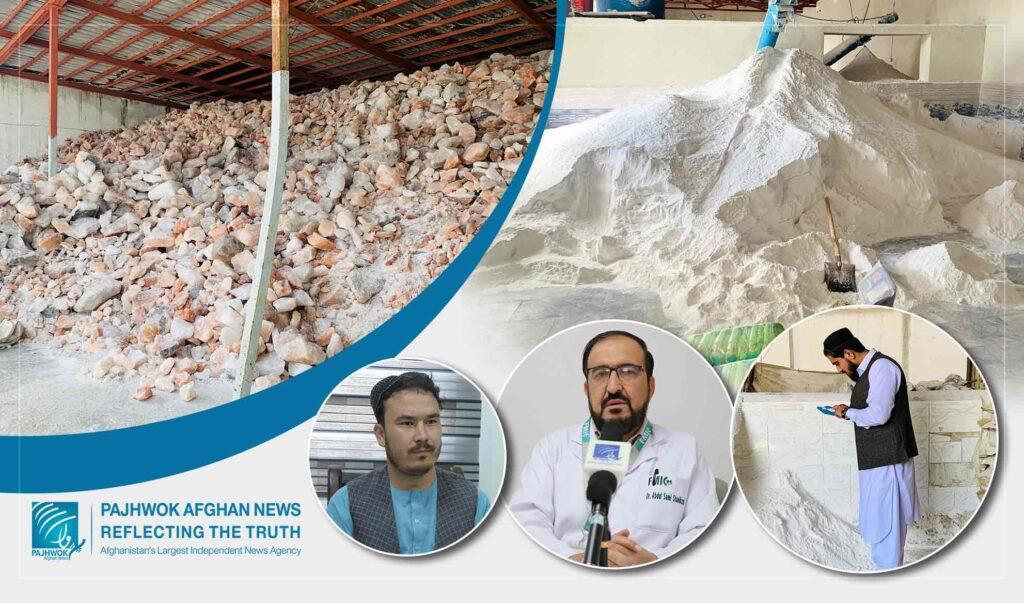
Moph: Most Salt Factories In Kabul Require Standardisation
KABUL (Pajhwok): The National Food and Drug Authority (NFDA) at the Ministry of Public Health (MoPH) says out of ten salt production factories in central capital city, only three meet the required standards, while the remaining ones need improvements.
They have been advised to align their operations with the established standards.
Pajhwok Afghan News has prepared this food safety report focusing on the quality of salt produced in the country.
7 out of 10 salt factories in Kabul require standardisation
Eng. Syed Niamat Hussainian, capacity building and public awareness expert at NFDA, told Pajhwok that currently 53 salt production and processing factories were operating across the country, with ten located in Kabul city.
He said:“Over the past year, our risk analysis team has inspected ten salt factories in Kabul. Similar inspections have also been carried out by our provincial teams.”
He explained three of the large factories were officially registered with MoPH and were capable of meeting the county's salt production and processing needs. However, the remaining seven were small-scale operations with limited output and must standardise their activities.
He added:“Most of these factories are close to meeting the required standards. The Economic Commission has given them a six-month deadline to fully comply. We have issued the necessary warnings to ensure they take swift action and improve production. Since the import of salt has been completely banned, local production must increase.”
He urged producers to obtain certification and licences from MoPH and ensure their products were hygienic and free from physical or chemical contamination.
Challenges & contamination
Regarding the challenges in salt production, Hussainian said:“Contamination in salt is common- from dust to heavy metals- and laboratory tests show that the iodine content in many samples is much lower than the standard level.”
85 tonnes of substandard salt collected
Hussainian noted that during inspections, around 85 tonnes of substandard salt were seized.
“We removed these from the food supply chain and transferred them to other industries, such as ice-making and poultry farms,” he said.
He explained that identifying poor-quality salt was quite simple.“If the salt dissolves clearly in a glass of water, it is of good quality, if impurities appear, it is substandard. Some salts are produced in completely unhygienic environments.”
Factory owner's remarks
Abdul Azim Nijati, head of a salt production and processing factory in Kabul, said his factory was established two years ago and imported raw materials from Takhar province.
He said:“We sell 50 to 70 packets of salt daily. I cannot personally comment on the standard of my factory, but we are inspected by NFDA twice or more each year. Thankfully, we have not faced any issues related to hygiene or more and religious principles.”
Pajhwok also attempted to interview representatives of other salt factories, but they declined to comment.
Health impacts of contaminated or low-quality salt
According to Eng. Niamat Hussainian, contamination and low iodine levels in salt could cause various health problems, particularly affecting the hormonal system, notably the thyroid gland, which could lead to goitre.
He added:“Contaminated or low-iodine salt can also affect digestive system, cause deposits in blood vessels, block blood flow and even lead to heart disease. Low iodine can reduce children's intelligence levels, posing risks for future generations. Continuous use of dusty or metal-contaminated salt can also damage the digestive system and cause chronic illnesses.”
Dr. Abdul Sami Stanikzai, an internal medicine specialist at the French Medical Institute for Mothers and Children, said iodine was an essential mineral that the human body could not produce and must therefore be obtained through food or iodised salt.
He said:“Iodine is vital for producing thyroid hormones, which regulate metabolism. Without adequate iodine intake, hormone production stops, leading to goitre and other disorders.”
He added iodine deficiency in pregnant women could cause miscarriages, stillbirths, mental disabilities, low birth weight and delayed brain development in infants. In children, it can results in low intelligence, learning difficulties, slow physical and mental growth, speech and mental retardation.
He stressed that the production of low-quality or non-iodised salt should be banned and non-complaint companies must be closed.
“Factories should be held accountable- human life must not be jeopardised for profit,” he said.
He advised citizens to buy packaged iodised salt approved by MoPH, store it in a dry, dark, airtight container to preserve iodine, add salt at the end of cooking to prevent iodine loss and avoid buying unlabelled or unpackaged salt.
Meanwhile, Dr. Nisar Ahmad Zaheer, an internal medicine specialist, said excessive salt consumption could cause high blood pressure, heart attacks and strokes.
He added that using non-iodised salt can cause goitre, reduce children's mental capacity, stunt growth and increase the risk of miscarriage or stillbirth in pregnant women.
He said the use of poor-quality or non-iodised salt was widespread in Afghanistan, particularly in mountainous areas where people lack access to iodised salt. As a result, thyroid disorders such as goitre and hypothyroidism are common.
He urged citizens to use iodised salt with MoPH's official label, ensure the packaging was sealed and not expired and avoid unbranded salt.
Citizens urge strict monitoring of salt production
Ahmad Fayaz, a falafel vendor outside Habibia High School, said:“We use iodised salt both here and at home. Since I started working, I've always used this salt. The label clearly states it contains iodine and has good quality.”
He added that both good- and poor-quality salts were available in the market, with high-quality salt being slightly more expensive.
He urged the Islamic Emirate of Afghanistan (IEA) to strictly monitor markets and remove substandard salt.
Similarly, Samiullah, a bolani seller in Kabul's Taimani area, said both types of salt- quality and poor- were sold in the market.“We once used a type of salt that appeared greyish and contained small stones,” he said.
Mola Dad, a resident of 7th police district in Kabul, also said:“The salt we use is refined, standard and iodised - it's very clean.”
He added that the quality of salt could easily be checked by dissolving it in water: if clear, it was refined and iodised, if cloudy, it was not purified.
All three citizens urged the IEA to prevent companies from producing poor-quality and non-iodised salt.
kk/ma

Legal Disclaimer:
MENAFN provides the
information “as is” without warranty of any kind. We do not accept
any responsibility or liability for the accuracy, content, images,
videos, licenses, completeness, legality, or reliability of the information
contained in this article. If you have any complaints or copyright
issues related to this article, kindly contact the provider above.
Most popular stories
Market Research

- Pepeto Presale Exceeds $6.93 Million Staking And Exchange Demo Released
- Citadel Launches Suiball, The First Sui-Native Hardware Wallet
- Luminadata Unveils GAAP & SOX-Trained AI Agents Achieving 99.8% Reconciliation Accuracy
- Tradesta Becomes The First Perpetuals Exchange To Launch Equities On Avalanche
- Thinkmarkets Adds Synthetic Indices To Its Product Offering
- Edgen Launches Multi‐Agent Intelligence Upgrade To Unify Crypto And Equity Analysis



















Comments
No comment